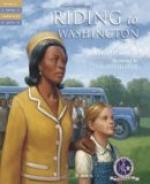In the village she was subjected to a good deal of ridicule. The children made fun of her on her way home from school, and called her “daft Lizzie”; the old folks, when they heard her muttering to herself, would shrug their shoulders and pass the remark that she was “nobbut a hauf-rocked ’un”—an insult peculiarly galling to her mother.
“A hauf-rocked ‘un!” she would exclaim. “Nay, I rocked her misel i’ t’ creddle while my shackles fair worked. Shoo taks after her dad, that’s what’s wrang wi’ Lizzie. A feckless gowk was Watmough; he couldn’t frame to do owt but play t’ fiddle i’ t’ sky-parlour, or sit ower t’ fire eatin’ fat-shives.”
Lizzie’s daftness was not a serious matter; it consisted partly in a certain dreaminess, which brought a yonderly look into her eyes, and made her inattentive to what was going on around her, and partly in that habit of talking to herself which has already been referred to. I had won her confidence and friendship from the time when I rescued her “pricky-back urchin” from being kicked to death by the farm boys, who declared that hedgehogs always made their way into the byres and milked the cows. Since then we had had many talks together, but this was the first time that I had accompanied her when she went to milk.
Milking in summer-time, when the cows are out at grass, is pleasant enough, but it is different of a winter evening. Then one gropes one’s way by the light of the stable lantern through the rain-sodden fields to the cowshed, the reeking atmosphere of which often makes one feel faint as one plunges into it from out of the frosty air. But Lizzie liked the work at all seasons, and was never so much at ease as when she was firmly planted on her stool, her curly head butting into a cow’s ribs, and the warm milk swishing rhythmically into her pail. There were three cows in the byre, and she had called them after her aunts. Eliza, like her namesake, was “contrairy,” and had to have her hind legs hobbled lest she should kick over the pail. Molly and Anne were docile beasts that chewed the cud with bovine complacency. It was Lizzie’s habit to tell the cows stories as she milked, making them up as she went along; but to-day she found a better listener in myself.
Our talk was at first of cows; thence it passed to village gossip, pigs, hedgehogs, and so back to cows once more. Knowing the imaginative bent of her mind, I put the question to her: “Wouldn’t you like to know just what becomes of the milk you send off to Leeds by train every day?”
“Aye, I like to know who sups t’ milk,” she answered, “an’ so does t’ cows.”
“But you can’t know that,” I said. “You don’t take it round to the houses.”
“Nay, I don’t tak it round to t’ houses, but I reckon out aforehand who’s to get it.”
It was evident that Lizzie had some private arrangement for the disposal of her milk, and I encouraged her to let me share her secret.




